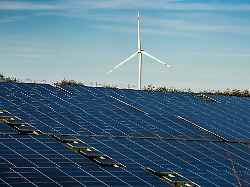Industry is unsettled
Habeck examines government guarantees for wind and solar power
11/21/2022 3:37 p.m
In order to achieve the climate goals, renewable energies must be massively expanded. However, the industry complains about planning uncertainty. Economics Minister Habeck wants to counteract this and restore confidence in the markets.
Federal Economics Minister Robert Habeck is open to boosting the production of wind and solar systems in Germany with subsidy programs. He wants to check whether state guarantees are possible, said the Green politician in Berlin after consultations with industry representatives. It is about production or purchase guarantees. In addition to the expansion of green electricity, the goal is also to rebuild the industrial production of systems in Germany.
The market is very unsettled, said Habeck. The manufacturers said they only invest when the orders are there. “However, we cannot afford to wait this long because it will mean that production will take place somewhere else in the world.” The political goal is to build a functioning market. “Over this phase we will need government measures to support confidence in the markets,” said Habeck. Approval procedures for new wind turbines, for example, would have to be accelerated, and access to capital for investments in production capacities would have to be facilitated.
One suggestion from the industry is that the state create production or purchase guarantees, said Habeck. This could make sense because so far the production of systems has only started when the order is there – but the order is only awarded once the approval has been received. With guarantees, the ramp-up of the industry could be correspondingly faster. The instrument has “a lot of charm”. The Ministry of Economic Affairs is examining whether it is a legally viable option.
Location competition with USA and China
The federal government wants to expand renewable energies from wind and sun significantly in the coming years in order to achieve climate goals and become less dependent on fossil fuels. Habeck said that sufficient availability of the appropriate systems and technologies in Germany and Europe is crucial. Hermann Albers, President of the German Wind Energy Association, said that stable orders are the most important basis for achieving market success. Approval procedures urgently need to be shortened.
Jörg Ebel, President of the German Solar Industry Association, said the most important factor for building production capacity is the home market. There is great entrepreneurial interest in rebuilding the European solar industry. Billions in investments would be needed. One stands in a location competition with China, the USA and India. Around a decade ago, the German solar industry had lost its great importance in the face of competition from Asia. Many companies had to file for bankruptcy or were sold abroad.
Cost increase for LNG terminals “necessary”
Habeck, meanwhile, defended doubling the cost of acquiring and maintaining floating liquefied natural gas terminals. He attributed the cost increase by more than doubling to a good 6.5 billion euros to the higher number of planned LNG plants and the expenditure for infrastructure expansion. It was politically necessary to state-finance these terminals to improve Germany’s energy supply. “We are now at six state-organized projects. It must also be said that six projects were not on the market before,” explained Habeck. In the 2022 budget draft from spring, 2.94 billion euros were planned for the LNG terminals.
According to Habeck’s assessment, the need for state financing of the liquid gas terminals results from the logic that no market-based projects have emerged to date. The government has accelerated the construction of the new liquid gas terminals so that they can be connected to the grid quickly, as in Wilhelmshaven and Brunsbüttel. This was done in order “to be able to make a further contribution to making the energy supply, in this case the gas supply, more secure in Germany,” stressed Habeck. “I want to emphasize once again that this is politically necessary.”
He is also confident that the higher costs will “partially” be recovered through the network charges. “Because if LNG, i.e. gas, flows into Germany through these projects, then part of the costs will be recovered through fees,” said Habeck. “What part of the cost is difficult to calculate. It’s not (but) a one-way street.”
At the turn of the year 2022/23, the Hoegh Esperanza liquefied natural gas terminal is to be put into operation at the Wilhelmshaven site. Another Hoegh ship is also to be stationed in Brunsbüttel at the turn of the year. The other planned LNG terminals are also to be used in northern Germany.
